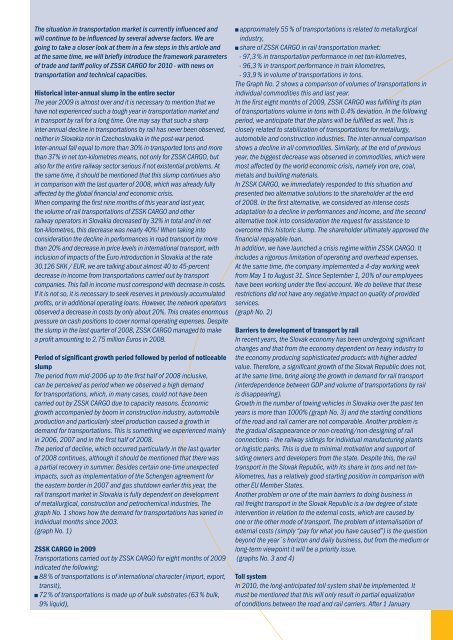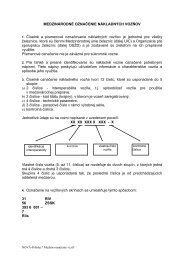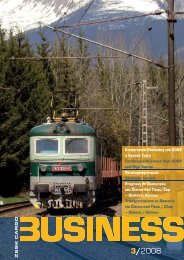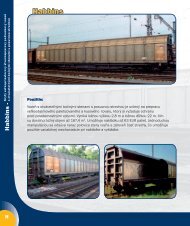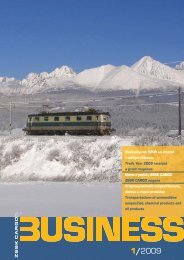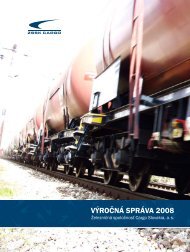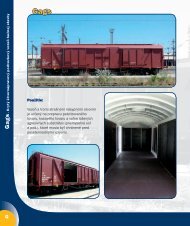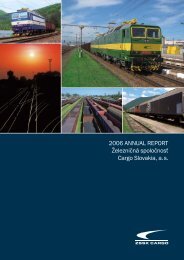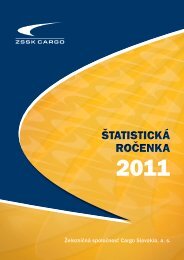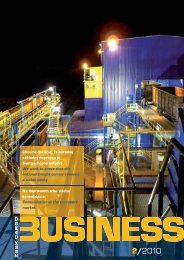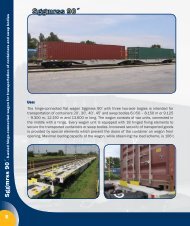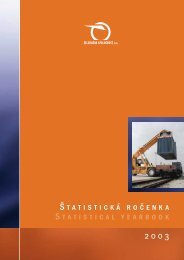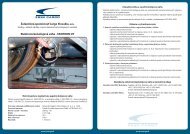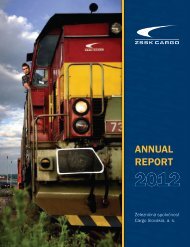CARGO BUSINESS 3-09.indd - ZSSK Cargo
CARGO BUSINESS 3-09.indd - ZSSK Cargo
CARGO BUSINESS 3-09.indd - ZSSK Cargo
Create successful ePaper yourself
Turn your PDF publications into a flip-book with our unique Google optimized e-Paper software.
The situation in transportation market is currently influenced and<br />
will continue to be influenced by several adverse factors. We are<br />
going to take a closer look at them in a few steps in this article and<br />
at the same time, we will briefly introduce the framework parameters<br />
of trade and tariff policy of <strong>ZSSK</strong> <strong>CARGO</strong> for 2010 - with news on<br />
transportation and technical capacities.<br />
Historical inter-annual slump in the entire sector<br />
The year 2009 is almost over and it is necessary to mention that we<br />
have not experienced such a tough year in transportation market and<br />
in transport by rail for a long time. One may say that such a sharp<br />
inter-annual decline in transportations by rail has never been observed,<br />
neither in Slovakia nor in Czechoslovakia in the post-war period.<br />
Inter-annual fall equal to more than 30% in transported tons and more<br />
than 37% in net ton-kilometres means, not only for <strong>ZSSK</strong> <strong>CARGO</strong>, but<br />
also for the entire railway sector serious if not existential problems. At<br />
the same time, it should be mentioned that this slump continues also<br />
in comparison with the last quarter of 2008, which was already fully<br />
affected by the global financial and economic crisis.<br />
When comparing the first nine months of this year and last year,<br />
the volume of rail transportations of <strong>ZSSK</strong> <strong>CARGO</strong> and other<br />
railway operators in Slovakia decreased by 32% in total and in net<br />
ton-kilometres, this decrease was nearly 40%! When taking into<br />
consideration the decline in performances in road transport by more<br />
than 20% and decrease in price levels in international transport, with<br />
inclusion of impacts of the Euro introduction in Slovakia at the rate<br />
30.126 SKK / EUR, we are talking about almost 40 to 45-percent<br />
decrease in income from transportations carried out by transport<br />
companies. This fall in income must correspond with decrease in costs.<br />
If it is not so, it is necessary to seek reserves in previously accumulated<br />
profits, or in additional operating loans. However, the network operators<br />
observed a decrease in costs by only about 20%. This creates enormous<br />
pressure on cash positions to cover normal operating expenses. Despite<br />
the slump in the last quarter of 2008, <strong>ZSSK</strong> <strong>CARGO</strong> managed to make<br />
a profit amounting to 2.75 million Euros in 2008.<br />
Period of significant growth period followed by period of noticeable<br />
slump<br />
The period from mid-2006 up to the first half of 2008 inclusive,<br />
can be perceived as period when we observed a high demand<br />
for transportations, which, in many cases, could not have been<br />
carried out by <strong>ZSSK</strong> <strong>CARGO</strong> due to capacity reasons. Economic<br />
growth accompanied by boom in construction industry, automobile<br />
production and particularly steel production caused a growth in<br />
demand for transportations. This is something we experienced mainly<br />
in 2006, 2007 and in the first half of 2008.<br />
The period of decline, which occurred particularly in the last quarter<br />
of 2008 continues, although it should be mentioned that there was<br />
a partial recovery in summer. Besides certain one-time unexpected<br />
impacts, such as implementation of the Schengen agreement for<br />
the eastern border in 2007 and gas shutdown earlier this year, the<br />
rail transport market in Slovakia is fully dependent on development<br />
of metallurgical, construction and petrochemical industries. The<br />
graph No. 1 shows how the demand for transportations has varied in<br />
individual months since 2003.<br />
(graph No. 1)<br />
<strong>ZSSK</strong> <strong>CARGO</strong> in 2009<br />
Transportations carried out by <strong>ZSSK</strong> <strong>CARGO</strong> for eight months of 2009<br />
indicated the following:<br />
88 % of transportations is of international character (import, export,<br />
transit),<br />
72 % of transportations is made up of bulk substrates (63 % bulk,<br />
9% liquid),<br />
approximately 55 % of transportations is related to metallurgical<br />
industry,<br />
share of <strong>ZSSK</strong> <strong>CARGO</strong> in rail transportation market:<br />
- 97,3 % in transportation performance in net ton-kilometres,<br />
- 96,3 % in transport performance in train kilometres,<br />
- 93,9 % in volume of transportations in tons.<br />
The Graph No. 2 shows a comparison of volumes of transportations in<br />
individual commodities this and last year.<br />
In the first eight months of 2009, <strong>ZSSK</strong> <strong>CARGO</strong> was fulfilling its plan<br />
of transportations volume in tons with 0.4% deviation. In the following<br />
period, we anticipate that the plans will be fulfilled as well. This is<br />
closely related to stabilization of transportations for metallurgy,<br />
automobile and construction industries. The inter-annual comparison<br />
shows a decline in all commodities. Similarly, at the end of previous<br />
year, the biggest decrease was observed in commodities, which were<br />
most affected by the world economic crisis, namely iron ore, coal,<br />
metals and building materials.<br />
In <strong>ZSSK</strong> <strong>CARGO</strong>, we immediately responded to this situation and<br />
presented two alternative solutions to the shareholder at the end<br />
of 2008. In the first alternative, we considered an intense costs<br />
adaptation to a decline in performances and income, and the second<br />
alternative took into consideration the request for assistance to<br />
overcome this historic slump. The shareholder ultimately approved the<br />
financial repayable loan.<br />
In addition, we have launched a crisis regime within <strong>ZSSK</strong> <strong>CARGO</strong>. It<br />
includes a rigorous limitation of operating and overhead expenses.<br />
At the same time, the company implemented a 4-day working week<br />
from May 1 to August 31. Since September 1, 20% of our employees<br />
have been working under the flexi-account. We do believe that these<br />
restrictions did not have any negative impact on quality of provided<br />
services.<br />
(graph No. 2)<br />
Barriers to development of transport by rail<br />
In recent years, the Slovak economy has been undergoing significant<br />
changes and that from the economy dependent on heavy industry to<br />
the economy producing sophisticated products with higher added<br />
value. Therefore, a significant growth of the Slovak Republic does not,<br />
at the same time, bring along the growth in demand for rail transport<br />
(interdependence between GDP and volume of transportations by rail<br />
is disappearing).<br />
Growth in the number of towing vehicles in Slovakia over the past ten<br />
years is more than 1000% (graph No. 3) and the starting conditions<br />
of the road and rail carrier are not comparable. Another problem is<br />
the gradual disappearance or non-creating/non-designing of rail<br />
connections - the railway sidings for individual manufacturing plants<br />
or logistic parks. This is due to minimal motivation and support of<br />
siding owners and developers from the state. Despite this, the rail<br />
transport in the Slovak Republic, with its share in tons and net tonkilometres,<br />
has a relatively good starting position in comparison with<br />
other EU Member States.<br />
Another problem or one of the main barriers to doing business in<br />
rail freight transport in the Slovak Republic is a low degree of state<br />
intervention in relation to the external costs, which are caused by<br />
one or the other mode of transport. The problem of internalisation of<br />
external costs (simply “pay for what you have caused”) is the question<br />
beyond the year´s horizon and daily business, but from the medium or<br />
long-term viewpoint it will be a priority issue.<br />
(graphs No. 3 and 4)<br />
Toll system<br />
In 2010, the long-anticipated toll system shall be implemented. It<br />
must be mentioned that this will only result in partial equalization<br />
of conditions between the road and rail carriers. After 1 January


